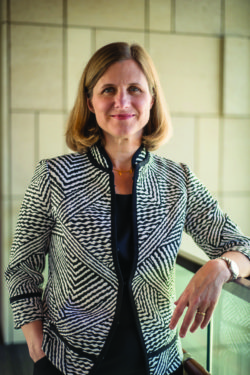From the Dean

Is it the “sharing,” the “gig,” the “access,” or the “taking” economy? Be careful. The term you use tends to telegraph your views on whether you celebrate or fear our new ways of finding lodging, buying goods and services, or hailing a ride. Whatever the appropriate term, though, there’s no question that how and with whom we do business has changed, and rapidly so, in recent years.
While we each may have favorites within the many options now available through the touch of a smartphone app—Do you use Lyft or Uber? TaskRabbit or Thumbtack?—we have a ways to go in understanding and solidifying the legal and regulatory architecture of this new economy. Drawing on the work of Stanford Law School faculty, graduates, and affiliates, our feature story in this issue delves into this territory. Are the service providers employees or independent contractors? Do computer platforms that facilitate peer-to-peer exchange have liability for defective products sold through the platform? How do antidiscrimination laws apply to the services provided to customers? It is no surprise that members of the extended Stanford Law family are playing a leading role in ironing out these issues in a variety of venues throughout the U.S. and abroad.
Many stories in this issue also emphasize the leadership Stanford Law has shown in the public sector. We include profiles of California’s new attorney general, Xavier Becerra; Judge Sunshine Sykes, the first Native American to sit on the Riverside County Superior Court; and Ed DuMont, now serving as the solicitor general of California. This issue also contains several stories about our students and graduates and the work they are doing in the rapidly changing areas of immigration policy and criminal justice policy. All of these pieces show us how, in one of the best traditions of our profession, many members of the SLS community are taking up the mantle of public leadership.
There is more in this issue that I know you will enjoy reading. We include Judge Raymond C. Fisher’s vivid remembrance of a giant of the judiciary, Judge William A. Norris. An extended interview by Professor Jenny Martinez with Peter Bouckaert, the inspiring director of emergencies for Human Rights Watch, reveals the challenges of engaging, full time, with human rights tragedies around the globe. Lest you have any worries about whether our current students will live up to the legacies of these extraordinary alumni, read the article about a number of our students earning pro bono distinction, and the one about the startup bootcamp held recently at SLS. I often say that whenever I find myself lapsing into pessimism, all I have to do is talk to some of our students and my mood lifts. I hope the pages of this magazine will give you the same sense that, with SLS graduates going out into the world, one cannot help but be optimistic about the future.
